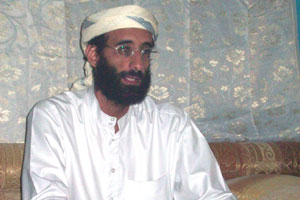
Flickr/<a href="http://www.flickr.com/photos/changedotgov/3177138857/sizes/m/in/photostream/">change.gov</a>.
Sometime during Barack Obama’s term in office, there’s a good chance an American citizen will be killed on the president’s orders.
Perhaps it will be Anwar al-Awlaki, the New Mexico-born Al Qaeda propagandist hiding in Yemen. Maybe it will be another of the “handful” of Americans reportedly on a list of citizens the government has determined are terrorists who can be legally killed by the CIA or the military’s Joint Special Operations Command. But if and when it happens, death will probably come almost instantaneously. It will likely arrive in the form of a $68,000 AGM-114 Hellfire missile, fired from an unmanned drone hovering somewhere above the clouds. The target will never know what hit him. And when that person meets his fiery end, it’s quite possible that the American people still won’t have a good sense of exactly why the President believes he has the legal authority to authorize the killing of US citizens without charge or trial.
The American Civil Liberties Union (ACLU) is trying to change that. Last January, the group filed a Freedom of Information Act (FOIA) request seeking a slew of documents relating to the Obama administration’s reported targeted killing program. Among the materials requested were any documents outlining the legal rationale for the program. That would presumably include memos produced by the Office of Legal Counsel (OLC), the division of the Justice Department that provides legal advice to the executive branch. (The government has yet to acknowledge that such documents even exist, but it is highly likely that they do.)
The ACLU could perhaps be forgiven for thinking that the Obama administration might be willing to release OLC memos—or at least parts of OLC memos—relating to the drone program. After all, the Obama team waited just three months after his inauguration before releasing extremely controversial Bush-era OLC memos authorizing interrogators to use waterboarding, sleep deprivation, “stress positions,” extreme temperatures, ear-splitting music, and “walling” on terrorist suspects. But when it comes to releasing the legal justifications for other controversial anti-terror practices, including its own, the Obama administration has dragged its feet.
It’s already been almost a year since the ACLU filed its original FOIA request, and nine months since the group sued to force the government to produce documents. The two sides are still locked in contentious negotiations. The CIA has refused to reveal whether it even possesses any documents responsive to the ACLU’s request—let alone explain, as required by law, what it is withholding and why. The DOJ, State Department, and Pentagon, meanwhile, haven’t made much more of an effort. The State Department provided the ACLU with seven documents that were already publicly available, while the other agencies have given up nothing at all.
Jonathan Manes, the ACLU legal fellow who is working on the FOIA litigation, is hoping to get the documents he wants before his fellowship expires at the end of this year. But that may not happen. Manes says that even if the government continues to negotiate with the ACLU, it could be as much as six months before State, DOJ, and the Pentagon produce anything at all, or even tell the ACLU what they want to withhold. And even if the agencies eventually provide some documents, there’s no guarantee that they’ll be useful. “It could just be a stack of redacted documents,” Manes says.
The Obama administration was supposed to be “the most open and transparent in history.” A key piece of that pledge was a memo the president signed on his first day in office instructing all agencies to adopt a “presumption in favor of disclosure” that “should be applied to all decisions involving FOIA.” Two months later, Attorney General Eric Holder issued his own memo [PDF] further explaining the new guidelines, and urging that “an agency should not withhold information simply because it may do so legally.” The OLC took a similar step: in a “best practices” memo [PDF] published in July 2010, David Barron, the acting head of the division, embraced the guidelines set out in both the president and the attorney general’s memos.
All of these moves were sold as a break from the Bush administration, which famously told agencies that it would defend withholding anything as long as there was some legal justification for doing so. But a March 2010 report by the watchdog group Citizens for Responsibility and Ethics in Washington (CREW) found that despite the Obama administration’s strongly-worded memos, “secrecy still dominates agency culture.”
“As a general matter, there is remarkable continuity between administrations on FOIA policy,” says John Elwood, a lawyer who served in the Bush-era OLC. “The institutional interests are the same.” Indeed—many of the career (i.e., non-political) government employees who manage and litigate FOIA matters for the Obama administration did the same jobs for the Bush administration. Without secrecy, governing—especially on the foreign policy and national security side of things—gets a lot harder. Every administration recognizes this.
All of this suggests that the release of the Bush-era OLC memos about controversial national security practices may remain an exception. The so-called “torture memos” were, after all, not operative—the OLC had disavowed their contents. Since they no longer reflected current policy, it was easier for the administration to release them. “In effect, they were historical records, not current ones,” says Steve Aftergood, a government secrecy expert at the Federation of American Scientists. “The records at issue in this case presumably pertain to current US policy and might be viewed as more sensitive.”
Neil Kinkopf, a law professor at Georgia State University who served in the Clinton-era OLC, says that while he supports OLC disclosure as a general principle, he understands why the Obama administration might want to withhold memos related to targeted killing.
When OLC is working as it should, Kinkopf says, legal opinions are narrowly tailored to specific circumstances. “OLC does not write abstract law review articles,” he says. A memo authorizing the assassination of a specific individual might include information about the informants who tipped the government off, the countries cooperating with the proposed attack, or the specific capabilities of the military technology used in the attack. That sort of classified information is often “indispensable to the legal reasoning,” Kinkopf says, and that poses a challenge to releasing the documents, even in part.
In early 2009, the president nominated Dawn Johnsen, a law professor who was a fierce critic of the Bush-era OLC, to run the agency on his watch. Her nomination stalled in the Senate, and she’s since returned to teaching. But she, too, seems to support the Obama administration’s reluctance to release OLC memos relating to the drone strikes.
“On matters of exceptional public importance, and I would include the drone attacks in that category, the executive branch should explain publicly its legal rationale for its authority to act, as a matter of good policy,” Johnsen says. But in most instances of national security, “the precise form that explanation takes should be left to the executive branch’s discretion, in order to safeguard national security and also not chill the asking and giving of good legal advice.”
As is typically the case with national security matters, the executive branch holds all the power here. It has the tools to hold back whatever it wants for a long time—first by delaying, then by releasing only what it wants to see made public. “The ACLU has a pretty good track record of pushing the government to disclose more than it wants to,” Aftergood says. But if the ACLU isn’t happy with what it gets (if anything), the group’s only option will be a protracted legal fight that it’s likely to lose. On matters of national security, the US court system has given great weight to the executive branch’s invocation of the “state secrets” privilege. Numerous lawsuits involving alleged torture, warrantless wiretapping, and extraordinary rendition have been thrown out on those grounds.
So since no court is likely to force the government to disclose the legal reasoning behind its targeted killing program, the ultimate decision will fall to President Obama and his advisers. In 2009, they made a policy decision to reveal the Bush-era documents despite having no legal obligation to do so. But will they make the same call when it comes to their own controversial policies?
Kinkopf thinks so. “The Obama administration ought to do what any administration ought to do: bend over backwards to release its legal opinions,” he says. “There are really important reasons to keep parts of them secret, redact them, perhaps even heavily. But it’s really important for people to see that when our government acts, it does everything it can to make sure its actions are in accordance with the law.”















